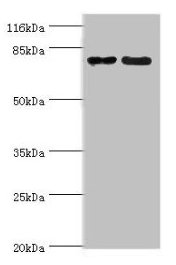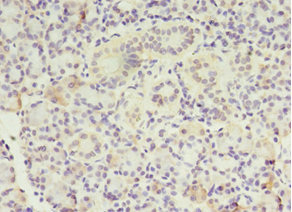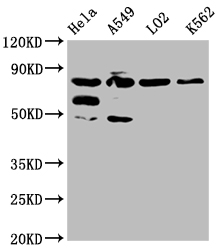MTRR Antibody
-
货号:CSB-PA890659EA01HU
-
规格:¥440
-
促销:
-
图片:
-
Western blot
All lanes: MTRR antibody at 2μg/ml
Lane 1: PC-3 whole cell lysate
Lane 2: HepG2 whole cell lysate
Secondary
Goat polyclonal to rabbit IgG at 1/10000 dilution
Predicted band size: 81, 78, 7 kDa
Observed band size: 81 kDa -
Immunohistochemistry of paraffin-embedded human pancreatic tissue using CSB-PA890659EA01HU at dilution of 1:100
-
Western Blot
Positive WB detected in: Hela whole cell lysate, A549 whole cell lysate, L02 whole cell lysate, K562 whole cell lysate
All lanes: MTRR antibody at 1:2000
Secondary
Goat polyclonal to rabbit IgG at 1/50000 dilution
Predicted band size: 81, 78, 7 kDa
Observed band size: 81 kDa
-
-
其他:
产品详情
-
产品描述:
CUSABIO uses the recombinant human methionine synthase reductase (MTRR) protein (1-725AA) to immunize rabbits to generate the anti-MTRR antibody. The resulting antibody is a polyclonal antibody and exists as an unconjugated IgG. It is purified by protein G and reaches up to 95% in purity. It only shows reactivity with human MTRR protein, which is required for activation of methionine synthase and plays a key role in methionine and folate homeostasis. And this MTRR antibody is suitable for the detection of MTRR protein in ELISA, WB, and IHC applications.
-
产品名称:Rabbit anti-Homo sapiens (Human) MTRR Polyclonal antibody
-
Uniprot No.:Q9UBK8
-
基因名:MTRR
-
别名:MTRR antibody; Methionine synthase reductase antibody; MSR antibody; EC 1.16.1.8 antibody
-
宿主:Rabbit
-
反应种属:Human
-
免疫原:Recombinant Human Methionine synthase reductase protein (1-725AA)
-
免疫原种属:Homo sapiens (Human)
-
标记方式:Non-conjugated
本页面中的产品,MTRR Antibody (CSB-PA890659EA01HU),的标记方式是Non-conjugated。对于MTRR Antibody,我们还提供其他标记。见下表:
-
克隆类型:Polyclonal
-
抗体亚型:IgG
-
纯化方式:>95%, Protein G purified
-
浓度:It differs from different batches. Please contact us to confirm it.
-
保存缓冲液:Preservative: 0.03% Proclin 300
Constituents: 50% Glycerol, 0.01M PBS, PH 7.4 -
产品提供形式:Liquid
-
应用范围:ELISA, WB, IHC
-
推荐稀释比:
Application Recommended Dilution WB 1:500-1:5000 IHC 1:20-1:200 -
Protocols:
-
储存条件:Upon receipt, store at -20°C or -80°C. Avoid repeated freeze.
-
货期:Basically, we can dispatch the products out in 1-3 working days after receiving your orders. Delivery time maybe differs from different purchasing way or location, please kindly consult your local distributors for specific delivery time.
相关产品
靶点详情
-
功能:Key enzyme in methionine and folate homeostasis responsible for the reactivation of methionine synthase (MTR/MS) activity by catalyzing the reductive methylation of MTR-bound cob(II)alamin. Cobalamin (vitamin B12) forms a complex with MTR to serve as an intermediary in methyl transfer reactions that cycles between MTR-bound methylcob(III)alamin and MTR bound-cob(I)alamin forms, and occasional oxidative escape of the cob(I)alamin intermediate during the catalytic cycle leads to the inactive cob(II)alamin species (Probable). The processing of cobalamin in the cytosol occurs in a multiprotein complex composed of at least MMACHC, MMADHC, MTRR and MTR which may contribute to shuttle safely and efficiently cobalamin towards MTR in order to produce methionine. Also necessary for the utilization of methyl groups from the folate cycle, thereby affecting transgenerational epigenetic inheritance. Also acts as a molecular chaperone for methionine synthase by stabilizing apoMTR and incorporating methylcob(III)alamin into apoMTR to form the holoenzyme. Also serves as an aquacob(III)alamin reductase by reducing aquacob(III)alamin to cob(II)alamin; this reduction leads to stimulation of the conversion of apoMTR and aquacob(III)alamin to MTR holoenzyme.
-
基因功能参考文献:
- 12 articles were included in this study. The pooled results did not reveal a significant association of the MTRR A66G polymorphism (G vs. A: OR = 0.99, 95% CI = 0.82-1.18, p = 0.72) with Nonsyndromic Cleft Lip With or Without Cleft Palate risk PMID: 30004262
- The gene polymorphism of MTRR A66G may not be an independent genetic risk factor in deep venous thrombosis in China. PMID: 29927730
- The genotypes of three women having spina bifida fetuses from two unrelated Chinese families were screened in candidate alleles. A trinucleotide deletion (c.4_6delAGG) was found in the first exon of MTRR only in the affected women, but not in their siblings with healthy babies or in controls. The Arg2del variant's subcellular localization and catalysis was unchanged, but it failed to efficiently activate MTR. PMID: 28712006
- Our results suggest an association between underweight and early childhood caries; in addition it is suggested that MTRR is a common genetic risk factor for early childhood caries and underweight PMID: 28118645
- higher frequency of 66GG genotype and 66G allele of MTRR 66A > G polymorphism observed in the women with pre-eclampsia compared to control group PMID: 27806663
- An association between the MTRR A66G polymorphism and LC ( p = 0.042) was found. In addition, this allele was observed more frequently in smokers compared to nonsmokers ( p = 0.030). In contrast, the distribution of the MTR 2756A>G and the MTRR 524 C> T allele frequencies were similar in the subject cases and controls. PMID: 28537809
- Meta-analysis suggests that MTRR 66A>G polymorphism may be associated with oligoasthenozoospermia risk. PMID: 28436330
- Study in Egyptian children showed that MTRR A66G and C524T polymorphisms were associated with a higher congenital heart diseases risk in the homozygote comparison of wild and mutant genotypes and also in heterozygote and mutant comparison. PMID: 28778621
- study widens the clinical, molecular, metabolic, and cytological knowledge of deficiency MTRR enzyme. PMID: 25978498
- The present study suggests that the G allele of MTR A2756G polymorphism is associated with an increased risk of autism. PMID: 28094822
- These findings indicate that the alternatively spliced form of MS expressed in SH-SY5Y human neuronal cells is sensitive to inhibition by thimerosal and neurotoxic metals, and lower GSH levels contribute to their inhibitory action. PMID: 26989453
- MTRR genetic polymorphisms are risk factor for predicting cardiovascular manifestations in Marfan syndrome. PMID: 26063524
- no association of rs1801394 with non-obstructive azoospermia PMID: 26196053
- an association between MTRR 66 and SHMT1 1420 polymorphisms and spaceflight-induced vision changes PMID: 26316272
- Results identified an allelic variant in the first intron of MTRR that is associated with increased risk of anencephaly in neural tube defects cases. PMID: 26045171
- Findings indicate an association between the single-nucleotide polymorphism A66G in the synthase reductase (MTRR A66G) gene and male infertility, particularly in oligoasthenozoospermia males. PMID: 25966116
- The findings of this study provide evidence that multiple sclerosis spinal cord simultaneously lack Cbl, EGF, and PrPCs. PMID: 25888933
- Results from the case-control study and meta-analysis suggest that both of the two polymorphisms MTHFR C677T and MTRR A66G Polymorphisms are not associated with being overweight/obesity PMID: 26016497
- A decrease of placental expression was noted for MTRR by 50% in pre-eclamptic women as compared to control group. PMID: 25801727
- MTRR 66GG genotype showed strong negative association with the risk of childhood brain tumors. PMID: 25809864
- More specifically, variants in methionine synthase reductase (MTRR) are not likely associated with capecitabine efficacy. PMID: 25815774
- The MTRR polymorphism represents a risk factor for the birth of a child with Down Syndrome among white Caucasian women. [Meta-analysis] PMID: 24965145
- MSR 524C/T polymorphism is associated with essential hypertension in ethnic groups in China. PMID: 26252105
- Review/Meta-analysis: suggest an association between MTRR A66G polymorphism and colorectal cancer susceptibility among Caucasians. PMID: 26214647
- meta analysis demonstrated that MTRR A66G polymorphism is a risk factor for congenital heart defects PMID: 24913415
- Heterogeneity across alcohol consumption status of the associations between MTR/MTRR polymorphisms and these cancers indicates potential interactions between alcohol drinking and one-carbon metabolic pathway PMID: 25337902
- This meta-analysis suggests that MTRR A66G GG is associated with decreased risk of leukemia in a Caucasian population and in children, especially for ALL. PMID: 24261678
- MTRR A66G polymorphisms have not been found to affect the hemostatic system in adolescents with Essential Hypertension. PMID: 25518505
- MTRR A66G polymorphism was not associated with breast cancer susceptibility. PMID: 24815481
- Reciprocal active site substitutions in CPR (H322A) and MSR (A312H) were created. Interflavin electron transfer was inhibited in CPR H322A and accelerated in MSR A312H. PMID: 24589657
- MTRR A66G gene polymorphism is associated with meningioma. PMID: 23959833
- Single nucleotide polymorphism in MTRR gene with LINE-1 methylation is associated with breast cancer. PMID: 24130171
- The distribution of MTHFR A1298C and MTRR A66G genotypes were not different between the fertile and infertile groups. PMID: 24334125
- [meta-analysis] MTRR A66G polymorphisms are not associated with risks for neural tube defects in Caucasian children. PMID: 23425389
- The 66GG and AG genotypes were associated with decreased odds ratios for heart defects. This overall association was driven by decreased risk for ventricular septal defect for 66GG and AG and decreased odds ratio for aortic valve stenosis for 66AG. PMID: 22475273
- A review of the influences of genetic polymorphisms in methionine synthase reductase on the occurrence of adverse effects from methotrexate therapy. PMID: 23986219
- Haplotype analysis suggests an association between MTRR haplotypes and reduced risk of migraine with aura. PMID: 23430981
- genetic association studies in population in China: Data suggest that an SNP in MTRR (C524T; S175L; rs1801394) is associated with decreased risk of Down syndrome in this population. PMID: 22925068
- maternal MTRR 66A>G polymorphism is associated with an increased risk of having a DS child.[Meta-Analysis] PMID: 23094987
- Rs6893114 in MTRR and alcohol consumption are associated with lung cancer risk in current smokers. PMID: 23372658
- Results indicate the importance of four gastric cancer susceptibility polymorphisms of IL-10, NOC3L, PSCA and MTRR in the Chinese Han population. PMID: 22796266
- The MTRR+66AA genotype may correlate with the severity of HD. PMID: 23039890
- studies suggest that SNPs in CBS and MTRR have sex-specific associations with aberrant methylation in the lung epithelium of smokers that could be mediated by the affected one-carbon metabolism and transsulfuration in the cells PMID: 22665368
- Known common single-nucleotide polymorphisms in MTRR and BHMT genes may not be significant risk factors for cororonary artery disease. PMID: 22339686
- the single-nucleotide polymorphism A66G MTRR is not involved in the development of breast cancer. PMID: 22236648
- The variant allele and genotypic frequencies in MTRR A66G gene was significantly higher in patients with UC compared to healthy controls. PMID: 21947961
- MTRR A66G polymorphism is a potential biomarker for cancer risk. PMID: 21547363
- MTRR A66G and cSHMT C1420T polymorphisms influence CpG island methylator phenotype of BNIP3, thus epigenetically regulating BNIP3 in breast cancer PMID: 21987236
- We have demonstrated that the MTRR c.56+781 A>C variant is an important genetic marker for increased congenital heart disease risk because this variant results in functionally reduced MTRR expression at the transcriptional level. PMID: 22179537
- MTRR polymorphisms did not appear to be an important genetic factor predisposing to idiopathic infertility in Brazilian men. PMID: 21775772
显示更多
收起更多
-
相关疾病:Homocystinuria-megaloblastic anemia, cblE complementation type (HMAE); Neural tube defects, folate-sensitive (NTDFS)
-
亚细胞定位:[Isoform B]: Cytoplasm.; [Isoform A]: Cytoplasm.
-
组织特异性:Found in all tissues tested, particularly abundant in skeletal muscle.
-
数据库链接:
HGNC: 7473
OMIM: 236270
KEGG: hsa:4552
STRING: 9606.ENSP00000264668
UniGene: Hs.481551
Most popular with customers
-
-
YWHAB Recombinant Monoclonal Antibody
Applications: ELISA, WB, IF, FC
Species Reactivity: Human, Mouse, Rat
-
Phospho-YAP1 (S127) Recombinant Monoclonal Antibody
Applications: ELISA, WB, IHC
Species Reactivity: Human
-
-
-
-
-
























